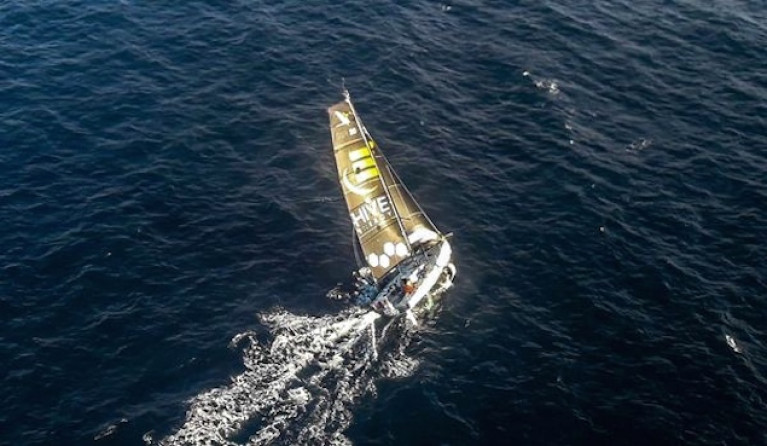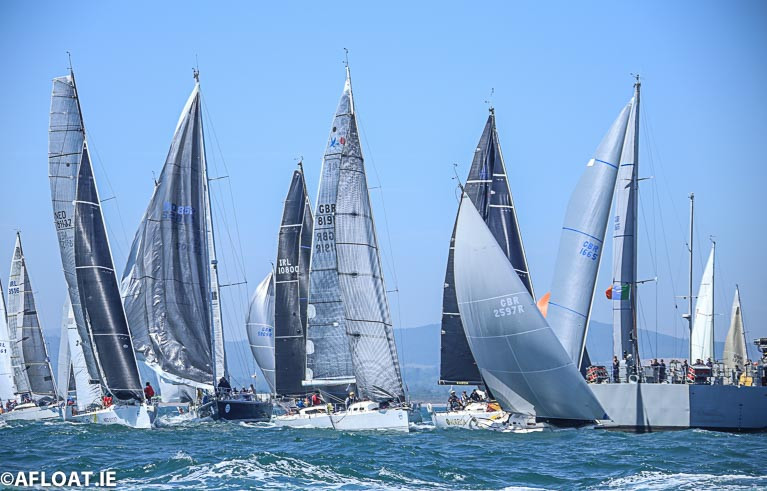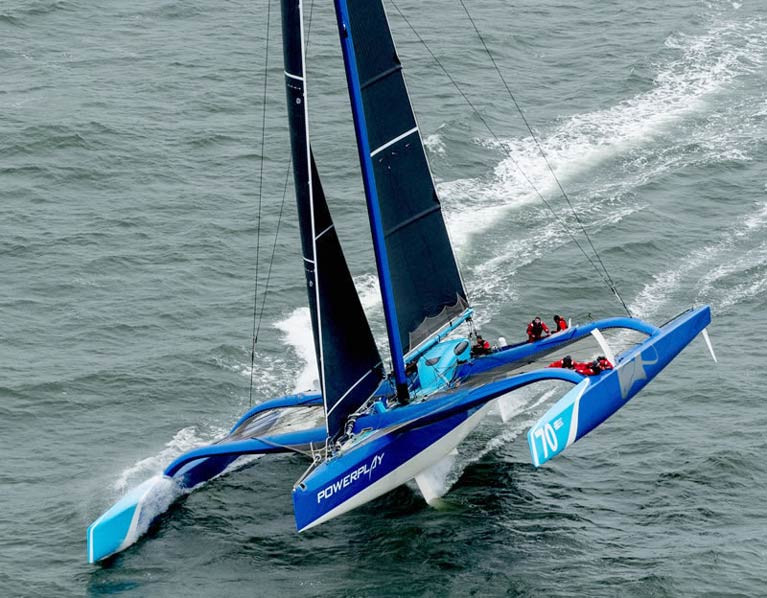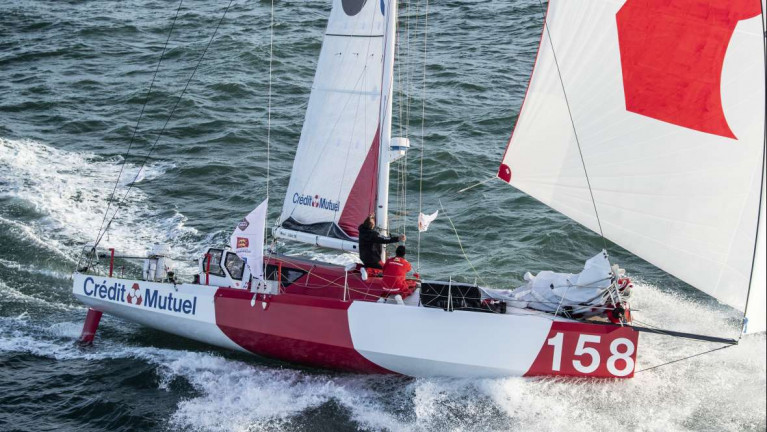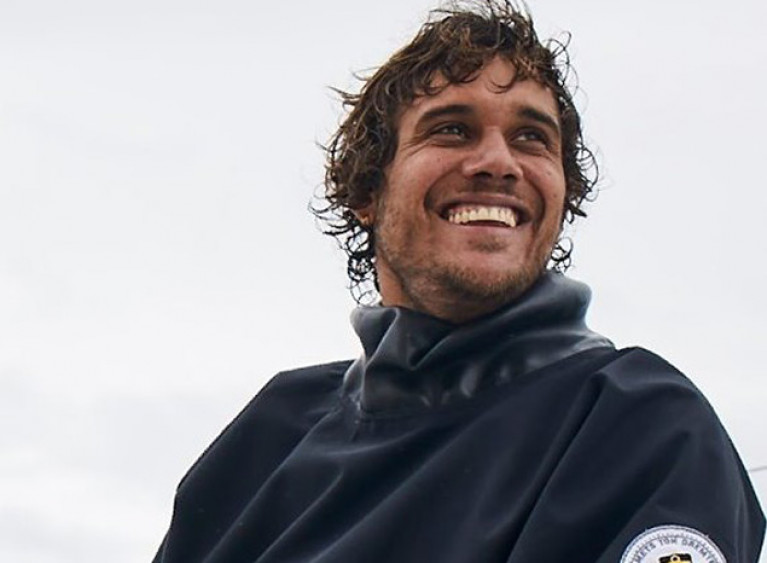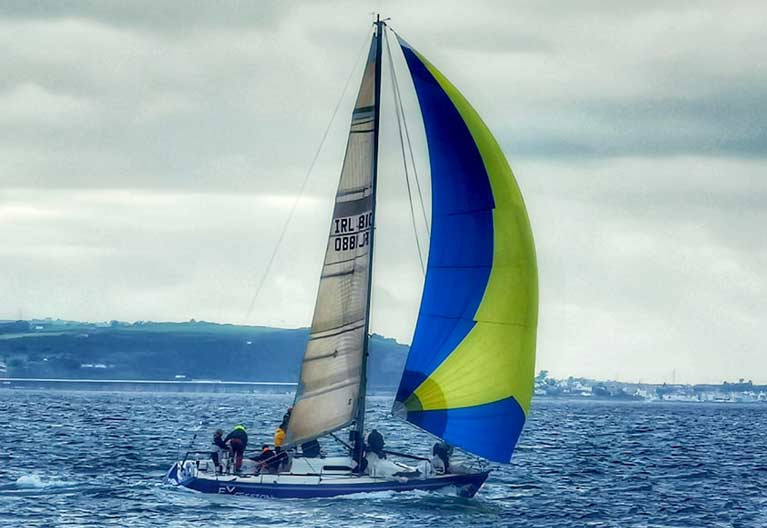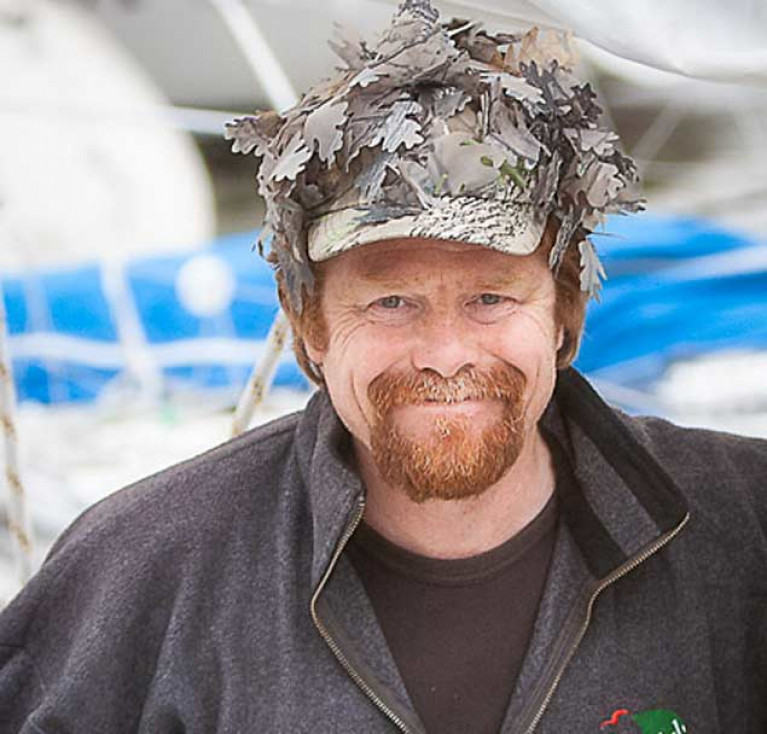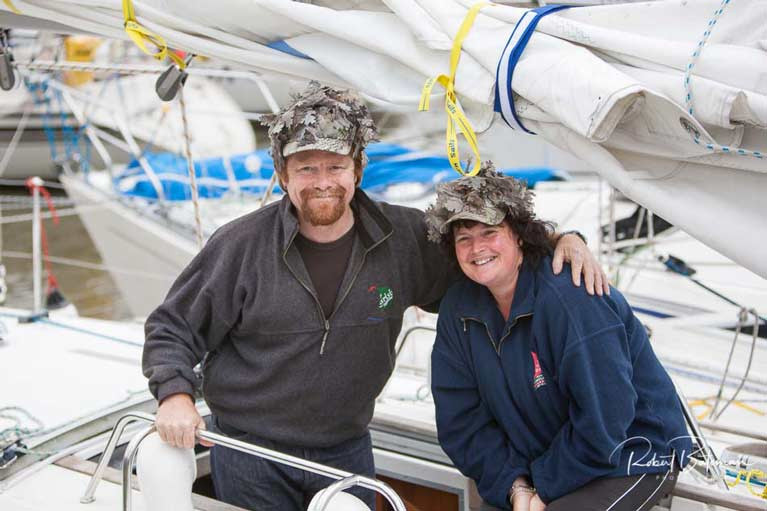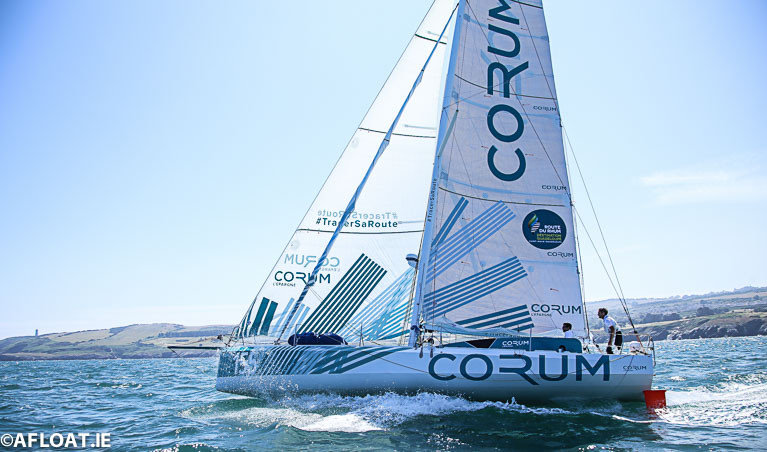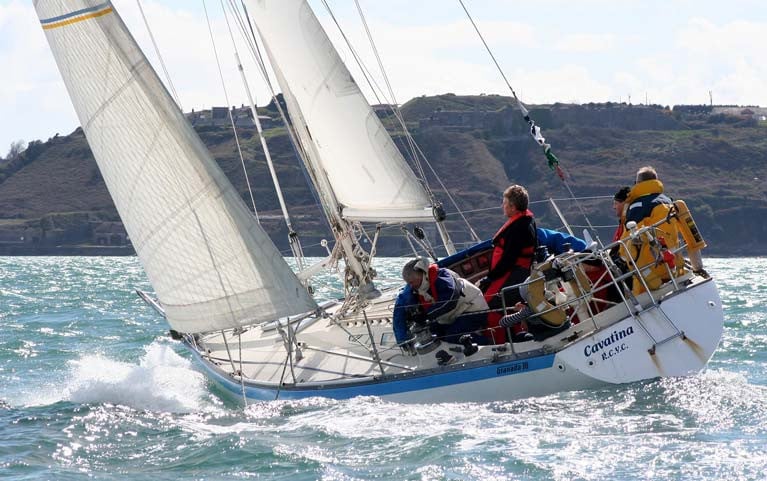Displaying items by tag: Round Ireland
Tide Strongly in Favour of Magenta Round Ireland Duo as They Sweep past Rathlin after a Challenging Night
Female Two-handed Round Ireland Record Day Four 0900hrs: When Pam Lee and Cat Hunt entered Day 3 of their Magenta Project Round Ireland Challenge at 0745 hrs this morning (Friday), they were nearer the Scottish coast than they were to the northern shores of Ireland. But they were reaping the benefit of the new favourable flood tide, after a difficult night spent beating to windward into the Sea of Moyle, the appropriate-sounding ancient name for the tide-riven area between the north of Ireland and the large Scottish southern Hebridean island of Islay.
Back at midnight, they'd got to Inishtrahull. But with the barometer rising, there was every chance that the calm which was settling over central Ireland for the night would spread northward over the sea. Thus any notion of short-tacking inshore along the north Irish Coast, in search of slacker water as the ebb tide ran west at full blast, was abandoned in favour of shaping a course well offshore where southeast to east wind was still to be found, even if there was little or no relenting of the adverse tides.
 Rathlin Island, Ireland's supreme tidal gate
Rathlin Island, Ireland's supreme tidal gate
They were around 5 miles from Islay's southwest headland as they tacked with the new flood starting make properly at 0640 hrs, with speed in a local tidal hot-spot at one stage getting up to 10 knots. And now, at 0840 and out in the less excitable waters getting rapidly clear of the Islay coast with a crisp passage past the supreme tidal gate of Rathlin Island in prospect, they are around 9.4 knots and rising, making the best of a light easterly and a surging fair tide.
Sailing Magenta Round Ireland Tracker
The conditions and their course are such that the tide will help to sharpen the apparent wind strength without making the sea unduly rough, so conditions are maximised for smooth progress by a tired crew brought back to life by real progress after an exceptionally difficult and wearing night.
After they've passed Fair Head and Tor Head on Ireland's northeast corner, they're clear of the worst of the tidal blackspot, and though a favourable tide right through the North Channel to the South Rock Light would be a bonus, as the new ebb begins to start running north again around noon that would be too much to hope for.
But with moderate mainly easterly winds forecast today for the North Channel, and with east to southeast wind indicated for the final leg from the South Rock to the official record line at the Kish Light off Dublin Bay, they've a good chance of continuing in a leading wind and overcoming any unfavourable tides for the rest of the day after the mighty hurdle of Rathlin has been cleared.
Next Magenta update on Afloat.ie will be early this afternoon, but meanwhile, at 0900 hrs they've 136 miles to the finish, and SOG is 10 knots.
Wicklow Sailing Club Cancels Round Ireland Yacht Race 2020
In a decision which will resonate with the national and international sailing community, and following intensive meetings all day, organisers Wicklow Sailing Club in concert with their many stakeholders have decided at 1845hrs today (Monday) that the circumstances of the COVID-19 pandemic make it inadvisable and impossible to stage the SSE Renewables Round Ireland Yacht Race 2020, which had already been put back by two months to August 22nd in the hope of a significant improvement in the general health and hazard situation.
Organisers say a full statement on the cancellation will be issued later this evening (issued Tuesday am - web editor), but meanwhile, the thoughts of all sailors will be with the gallant little Wicklow club, which had been so keenly anticipating and working towards staging the 21st biennial Round Ireland some 40 years after founding the event with just 16 starters in 1980.
Over fifty entries had been received for August's race. Read all Afloat's race updates in the build-up to the 2020 race here.
Afloat is keen to hear sailors views on the cancellation at [email protected]
Update 08.38 Tuesday, July 28:
Press Statement from Wicklow Sailing Club
Global increase in Covid cases forces cancellation of rescheduled SSE Renewables Round Ireland Race
The sharp rise in global Covid-19 cases has forced Wicklow Sailing Club to cancel this year’s SSE Renewables Round Ireland Race, due to start on Saturday 22nd August. The next staging of the blue ribband sailing event will now take place in June 2022.
As early as March of this year, the 21st edition of the race was headed for a record turnout in excess of 60 teams in what would have been the Round Ireland’s 40th Anniversary year.
Following the introduction of initial Covid-19 lockdown restrictions the original start date of June 2020 was postponed to 22nd August to allow time for virus counter-measures to take effect. Even with Covid restrictions in place, entry numbers for this year’s rescheduled race from Irish and international competitors held around the 50-boat mark.
In the months since the postponement, Wicklow Sailing Club has been consulting diligently with various stake-holders including race participants, sponsor SSE Renewables, Wicklow County Council and Irish Sailing among others to agree a range of mitigation measures onshore and offshore to allow the race event to proceed safely while adhering to Covid-19 guidelines.
However, despite these mitigations, Wicklow Sailing Club has taken the decision to cancel this year’s SSE Renewables Round Ireland Race in the best interests of participants and volunteer support crews, and in response to concerns around the recent sharp rise in global Covid-19 cases.
The next edition in 2022 of the 704-nautical mile race that has been dubbed “the Kilimanjaro of Sailing” is unaffected at this time.
“For a time, it seemed like we were on track to stage a successful race albeit with significant mitigation measures that people would understand,” commented Kyran O'Grady, Commodore of Wicklow Sailing Club. “But the global situation with the virus is precarious and while under some control in Ireland now, who knows where we might be in just a few weeks’ time.
“We could easily run the race for entries from the island of Ireland only and possibly restrict visiting international teams from coming ashore before and after the race. But this runs against both the spirit of this classic race and our tradition at Wicklow Sailing Club of welcoming all competitors. Our competitors need certainty as soon as possible and our first priority must always be the safety of participants and those supporting the delivery of this sporting event.”
Race title sponsor SSE Renewables has expressed its support for the decision by Wicklow Sailing Club. Barry Kilcline, Director of Development at SSE Renewables, said: “We have been hugely impressed at the great deal of work invested by Wicklow Sailing Club and other key national and local stakeholders to respond to the impact Covid-19 has had on this year’s staging of the Round Ireland. As the most prominent international offshore sailing event staged in Ireland, the decision to have to cancel this year’s event is clearly disappointing for everyone in the sailing community and in Wicklow in particular.”
“However, clearly in the context of the pandemic the decision to cancel is also the most appropriate and necessary response. As race sponsor Wicklow Sailing Club is assured of our full support in this regard and we will work with the club as it prepares plans for the next staging in 2022.”
Further information about Round Ireland 2022 will be issued in the coming weeks.
Giant MOD 70 Trimaran 'Powerplay' Enters Round Ireland Yacht Race Bringing Entries to 50 So Far
A new Round Ireland Race record speed time is in prospect with the entry of a MOD70 trimaran into the 21st edition of the race from Wicklow.
There is no doubting the appeal of August's classic Irish offshore with the entry of one of the world’s fastest offshore race boats.
Peter Cunningham's high-speed UK giant 'Powerplay' brings entries to 50 so far in the biennial 700-mile circumnavigation.
If conditions permit, Cunningham will be out to beat the outright race record of 38 h 37 min 7 seconds that is is held by another MOD-70, Musandam-Oman Sail and was set in June 2016.
Powerplay follows two more potent international entries received at Race HQ with more to come before the starting gun sounds in one month.
JPK11.80 entry
A Hamburg based Mach 40.3, Rockall has been entered by Christopher Opielok and the UK's Ed Bell has joined the race with the JPK 11.80, Dawn Treader adding to the competition for overall IRC honours.
Mini Transat Winner and 2018 Round Ireland Yacht Race contestant Ian Lipinski has set a Round Britain solo record.
On Friday, 10 July, the Class40 Credit Mutuel skipper crossed the virtual finish line by crossing Cape Lizard, to set this new racing record of 7 days 17 hours, 50 minutes and 48 seconds (subject to verification).
Lipinski broke the record set by Phil Sharp in the Race Around Britain and Ireland race in 2018 by 10 hours 24 minutes and 1 second.
More on this record from Sail Web here.
As regular Afloat readers will know, Lipinski co-skippered a brand new Mach 40 'Corum in the 2018 Round Ireland and got off to a stunning start off Wicklow Head two years ago.
French Class 40 boats are returning to the Irish race track for August's 700-miler too.
Another international entry for August's SSE Renewables Round Ireland Yacht Race adds extra spice to a growing French Class 40 division with the arrival of the Lorient based Mach 40.3, Taras Boulba skippered by Charles-Louis Mourruau.
Overall, it brings entries to the Irish classic to 47, just days before the early bird entry expires and seven weeks before the race start on August 22nd.
Mourruau's Taras Boulba is the second Class 40 boat to enter joining Antoine Magre's Palanad 3 from La Trinite sur Mer.
Class 40 is a monohull sailboat primarily used for short-handed offshore and coastal racing and popular in France.
The French interest is a satisfying return on investment by Race organiser Kyran O'Grady whose pioneering efforts at the Paris Boat Show last December now bear fruit with a bumper international Round Ireland fleet still in prospect.
It is understood the cancellation of Class 40s Transatlantic race due to COVID-19 in May has also led the French sailors to look further afield for racing this year.
Meanwhile, as Afloat previously reported, the Welsh ISORA fleet can still swell Round Ireland Yacht Race entry further with up to six or seven Pwllheli boats yet to enter.
The second Northern Ireland entry for August's Round Ireland Race is, as Afloat previously reported, the Belfast Lough IMX 38 eXcession entered by owners Ruan O'Tiarnaigh from Ballyholme YC, John Harrington (Royal Ulster) and Johnny Mulholland, also from Bangor.
Joining those three will be Kenneth Sharp, Clyde/Ballyholme, Stuart Ogg Donaghadee SC, Jim Tennyson Lough Neagh SC, John O'Connor Portaferry SC, Mark McClughan Royal North of Ireland YC and from Sutton Dinghy Club, O'Tiarnaigh’s old stomping ground in a GP14, is Stephen Boyle.
O'Tiarnaigh has competed in the Round Ireland twice before. In 2006 he was on board Stuart Thwaites’ 31m Konica Minolta from Wellington, New Zealand, taking line honours; and in 2008 as skipper on Galileo, Sean Lemass and Tony Tennyson’s Beneteau 47.7, placing 4th.
Ruan was disappointed not to be able to compete in Cork Week 300 or the RC35 circuit, both cancelled due to COVID 19. He told Afloat, “as my late father Riocard would say, 'One must bend with the bamboo' so when the Round Ireland was re-scheduled, it became the focus of our season. Our only issue at this stage is getting sufficient crew qualified with the OSR as COVID restrictions are preventing the mandatory life raft training being run, but we are working with the course suppliers to ensure that we shall be compliant in good time”.
Father and son duo Johnny and Jamie Ritchie in the Dufour 41 Classic Mingulay, also from RUYC, is the other Northern Ireland entry.
I got a strong, supportive reaction to last week’s Podcast in which Glandore Harbour Yacht Club’s Sailing Secretary Hal Andrews, said it was “a nightmare” trying to organise sailing with social distancing. The response to his view was overwhelmingly supportive.
Hal Emailed me since the Podcast to say that he hoped his assessment was “not too gloomy.” He did not need to worry. It reflected most people’s thinking and mine too.
While the national sailing authority continues to seek changes or exceptions for the boating world – and it is to be hoped they can – until early August social distancing and limits on family units seem to leave solo sailing as the main opportunity.
Young sailors have been taking advantage of that on the waters of Cork Harbour in the glorious weather of the past few days. There have also been a few cruisers, apparently with families, venturing forth.
But I cannot see crewed cruiser racing resuming for some time. I know of very few entirely crewed boats from family units in the same household.
One family boat and crew made news during the week when the Director of the Sovereign's Cup at Kinsale Yacht Club, Tony Kingston, announced the family’s Swan 40, Shindig, would be on the Wicklow Sailing Club Round Ireland start line on Saturday, August 22 - in the two/handed class.
Tony, a Cork Harbour port pilot, is my guest on this week’s Podcast (below)
Race regular Tony Kingston from Kinsale Yacht Club is the latest entry into the Round Ireland Yacht Race in his Swan 40, Shindig.
It brings entries back up to 40 so far allowing for a number of dropouts due to COVID-19.
As Afloat previously reported, three new arrivals means the 21st-anniversary fleet remains in a strong position with 12 weeks to the first gun off Wicklow.
Kingston, the KYC Sovereign's Cup Race director, placed 12th overall in the 1994 race in Amazing Grace and, as photographed above, raced two-handed in 2008 with Alice Kingston in Cracker to finish 21st.
As preparations continue for the SSE Renewables Round Ireland Race's new start date on August 22nd, there is speculation that the postponement could play into the hands of the Irish offshore race with a larger than normal French entry as the international Class 40 fleet eye the late summer fixture.
There are no additional French yachts registered so far for the 700-miler but it is understood the cancellation of Class 40s Transatlantic race due to COVID-19 in May has led the French sailors to look further afield for racing this year.
Class 40 is a type of monohull sailboat primarily used for short-handed offshore and coastal racing.
It may well be that Round Ireland Race Organiser Kyran O'Grady's pioneering efforts at the Paris Boat Show last December may yet bear fruit with a bumper international Round Ireland fleet.
As regular Afloat readers will know, Class 40 are no strangers to Irish waters or Round Ireland itself over the years with top Figaro sailor Nicolas Troussel competing off Wicklow two years ago.
Ireland's varied sailing waters are proving a popular testing ground for the international Class 40 fleet and a burgeoning Irish Mini class too. Evidence of this was in the 2018 Round Ireland Race fleet where the top French double-handed sailing duo were in action. International stars Troussel and Mini Transat Winner Ian Lipinski have teamed up to race the brand new Mach 40 'Corum'. They're not the only Class 40 on the Irish race track that year either as three other international entries also lined up.
What's more a fleet of Class 40s called to the Wexford coast in the 2018 Normandy Channel Race when the fleet rounded the Tuskar Rock and not without incident.
As well as French interest a number of British Class 40s are also looking at the Wicklow race, according to an Afloat source.
It all bodes well so far for August's Round Ireland, a race that could also get a domestic boost with the imprimatur of the GAA, according to Afloat's W M Nixon.
Back then, we didn’t know we were living. “Back then” was the first eight or so years of the 21st Century - not forever ago at all. Yet now it feels like not so much a foreign country as more like a different universe. Because back then, there was a buzz. Everything was on the move. It was Action Stations All Areas. It wasn’t a case of “Is it permissible under Government Regulations?” or “Can we do it?” It was more a matter of “When will we do it?” and “How soon will we do it?”
We may now have the makings of a Road Map out of the Covid-19 paralysis, but all the roads in it are long, and some are very winding indeed. As each stage is reached, it will be day-to-day pilotage rather than visionary navigation. And of course, its implementation will all depend on the scourge receding according to the hopeful scientific expectations.
How different it was back then, back when everything was a matter of just get up and go. Of course, there were some crazy episodes. One year, for instance, Ireland had something like three teams racing in the Commodore’s Cup. And they were racing against each other with such determination that there were absurd inter-Ireland protests.
So inevitably we didn’t finally win the Commodore’s Cup until 2010 with its ferocious economic downturn, with a very sober cost-effectively-planned recession-aware single team, put together with infinite patience by Anthony O’Leary and ICRA. But the recession was so deep that there was no defence in 2012, and while the same O’Leary determination won the Commodore’s back in 2014, there was a sense of it being a satisfactory way to end an era, but an unmistakable ending nevertheless.
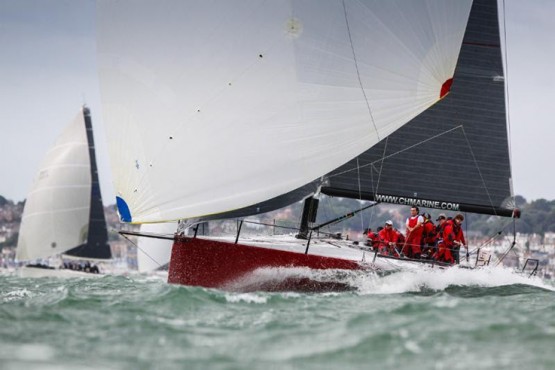 “The Red Antix” - Anthony O’Leary’s Ker 40 Antix was RORC “Yacht of the Year” and led Ireland to victory in the 2014 Commodore’s Cup in an outstanding success that marked the end of an era. Photo courtesy RCYC
“The Red Antix” - Anthony O’Leary’s Ker 40 Antix was RORC “Yacht of the Year” and led Ireland to victory in the 2014 Commodore’s Cup in an outstanding success that marked the end of an era. Photo courtesy RCYC
Yet in looking back to those early years of this now uncertain Century in which we are living with increasing difficulty, there are boats and successes which stand out, boats and achievements which seem to have endured some special test of time.
Everyone will have their own favourite superstar boats, and if we scratch about in the memory bin, others will emerge. But for me the first three that spring to mind are George Radley’s Holland 39 Imp and Eric Lisson’s Granada 38 Cavatina – both from Cork - and Ger O’Rourke’s Cookson 50 Chieftain from Kilrush.
Of course, there were other outstanding boats, such as the O’Leary family’s Antix in the white and silver and red versions. Yet there was something mainstream and extremely sensible about the superb O’Leary campaigns, whereas the wild card element is unmistakable in the doings of Chieftain and Imp and Cavatina.
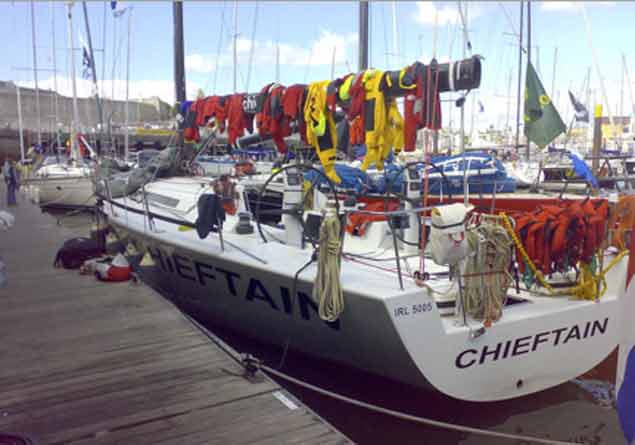 Drying out process….Chieftain in Plymouth after the Rolex Fastnet Race 2007. Photo: Ger O’Rourke
Drying out process….Chieftain in Plymouth after the Rolex Fastnet Race 2007. Photo: Ger O’Rourke
We focused on Chieftain a couple of weeks ago in highlighting her outstanding overall win in the 2007 Fastnet Race to round out an extraordinary global programme, a programme which had seen her win her class and come fourth overall in the 2005 Sydney-Hobart Race, and then place second in the 2007 New York to Hamburg Transatlantic race before going on to sweep the board in the Fastnet of that same year.
That was a sometimes chaotic gale-swept race which was already out of kilter at the start. The RORC fleet was still becoming accustomed to having the Fastnet start on the Sunday at the end of Cowes Week instead of the time-honoured Saturday, yet in 2007 a sudden gale saw its further postponement to the Monday 13th August, so it was right into the next weekend by the time most of the greatly-reduced fleet finished. And though Chieftain had finished late on the Thursday evening to take the win, the exhausted skipper had his work cut out getting his crew kitted out in clean white shirts for the prize-giving on the Friday.
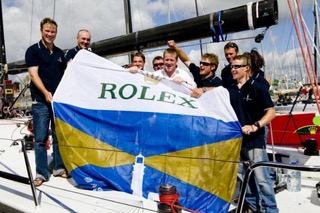 Magic moment – Chieftain’s crew – with Ger O’Rourke at centre – after they’d been told in Plymouth they were overall winners of the Rolex Fasten Race 2007. Photo courtesy Ger O’Rourke
Magic moment – Chieftain’s crew – with Ger O’Rourke at centre – after they’d been told in Plymouth they were overall winners of the Rolex Fasten Race 2007. Photo courtesy Ger O’Rourke
Ger has been through the mill more than somewhat since, as he had the misfortune to break his back in a kite-surfing accident in South Africa and spent a year out of action mending up after open-spine surgery. But he was in a fine nostalgic form when phoning out of Lockdown the other day, and sent on some photos of that Day of Days in Plymouth and the full names of his diverse international crew, who were Ger O’Rourke (IRL) skipper, Jochem Visser (NED) navigator, Dee O’Rourke (IRL) pit, Edwin O’Connor (IRL) Trim, Ryan Houston (NZ) Drive, Cam Marshall (NZ) Bow, Matthew Stuart (NZ) Trim, Tom Whelan (IRL) Trim, Robert Gullan (UK) Mid-bow, Donie Hegarty (IRL) Trim, Kevin Johnson (IRL) Trim, and Tom Whitburn (UK) Pit.
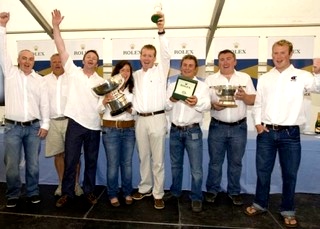 New white shirts all round – crewmember Dee O’Rourke and her skipper father Ger in the middle of Cheftain’s crew at the Rolex 2007 Fastnet Prizegiving
New white shirts all round – crewmember Dee O’Rourke and her skipper father Ger in the middle of Cheftain’s crew at the Rolex 2007 Fastnet Prizegiving
International they may be, but Ger’s roots in Limerick are so strong that he even has a link to the Limerick ketch Ilen, as Gary Mac Mahon of Ilen reckons it was he who introduced the hyper-energetic young Ger O’Rourke to sailing. Back in the 1980s, Willie Sexton’s bar on Henry Street in Limerick was where all the movers and shakers met on a Thursday night, and Gary mentioned in Sexton’s during a typical early-summer Thursday night that the following evening he was off to do a weekend boat delivery under sail, and Ger O’Rourke overheard that and said that he’d be interested in giving this sailing a try for the first time and…….well, history can take it from there.
In the case of Imp, the wild card recognition is because anything to do with George Radley and boats has a streak of wild card brilliance about it. George is a cradle sailor, yet his approach to sailing is sui generis, and the rest of the world can only wonder at what he’ll do next.
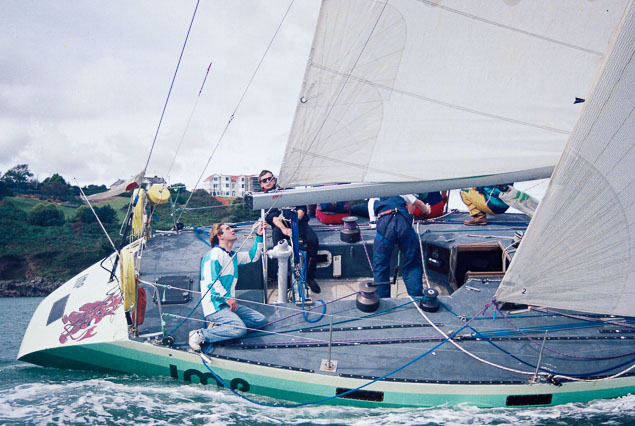 Doing it his way. George Radley at the helm of Imp Photo: Bob Bateman
Doing it his way. George Radley at the helm of Imp Photo: Bob Bateman
But in the case of Cavatina, the wild card is found firstly in the reality that although there were maybe about three dozen Granada 38s built between 1979 and 1983, Cavatina seems to be the only one which has been consistently campaigned offshore under the IRC rule, and she has been doing it with great success since before the turn of the Century.
In fact, her rating has seemed so favourable that when RORC measurer Mike Urwin was at Cork Week one year, he was asked to run the tapes over Cavatina to find out what was the secret ingredient. He reported back that there was no secret ingredient, she just happened to fit the rule very neatly, and maybe the secret ingredient was that her crew happened to sail Cavatina very well in offshore races of adult length.
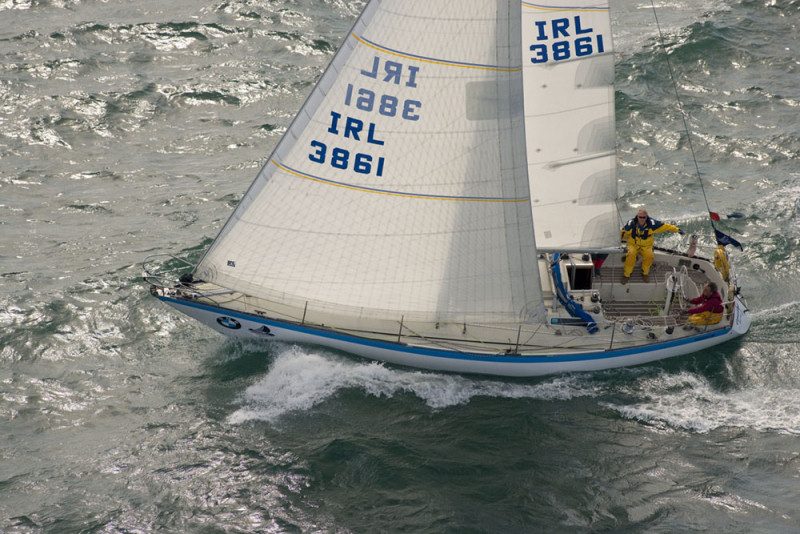 A very normal-looking superstar….Eric Lisson’s Cavatina on her way to winning the Round Ireland Race 2006. Photo: Round Ireland/David Branigan
A very normal-looking superstar….Eric Lisson’s Cavatina on her way to winning the Round Ireland Race 2006. Photo: Round Ireland/David Branigan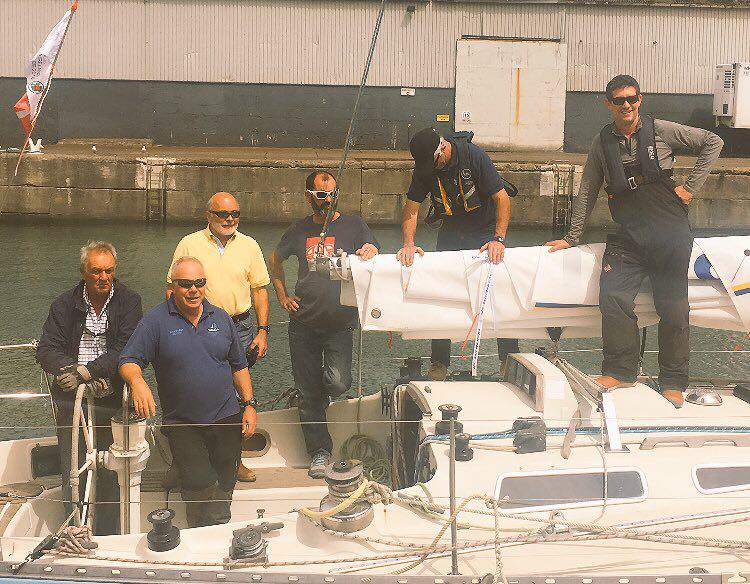 Boat and crew as one – the Cavatina team in Wicklow, scene of some of their major successes
Boat and crew as one – the Cavatina team in Wicklow, scene of some of their major successes
There’s probably a doctoral thesis to be written about Cavatina and her crew, who seem to have remained remarkably consistent in their makeup over the years under the ownership first of Eric Lisson, and more recently of Ian Hickey. Boat and crew, they know each other inside out, such that in any set of circumstances everyone will know what sail combination should be set in order to maximize performance, and they can often seem to communicate this knowledge through a sort of telepathy.
Thus they’re always seen as a threat by others in the Round Ireland Race when they’ve come from behind more than once to take the overall win, they’ve had at least two excellent Fastnets with second overall in 2005’s race and their class win in 2007 when Chieftain took the top prize, and before that in the same year, Eric Lisson and Dave Hennessy brought Cavatina the two-handed division and overall win in the Azores & Back Race.
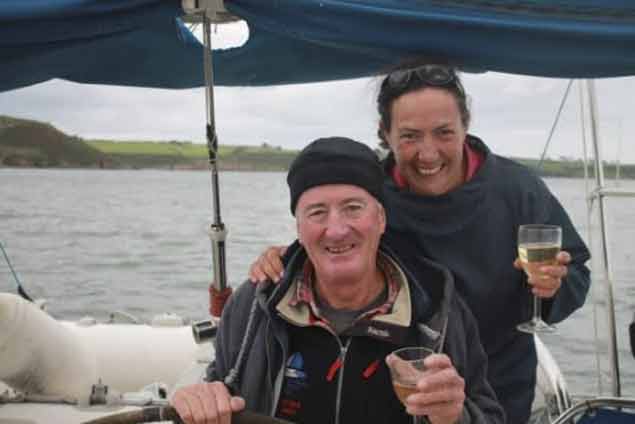 Global circumnavigators – Dave Hennessy and his wife Katrina Emtage on Laragh
Global circumnavigators – Dave Hennessy and his wife Katrina Emtage on Laragh
Dave has also logged a four-year global circumnavigation with the 1989-built Jeanneau Sun Magic 44 Laragh with his wife Katrina Emtage between 2013 and 2016, and they’ve been back to northwest Spain and the Azores since. On top of that, in shore life he’s a renowned melodeon player on the traditional music scene in Cork and beyond. In fact, he seems to achieve so much that you feel inclined to enquire of your usually reliable Cork sources if they’re sure we’re talking about one and the same Dave Hennessy around boats and music, and they’ll enigmatically reply they’ve often wondered the same themselves, but it seems he is just the one person, and here he is with melodeon and friends on YouTube
Meanwhile, we look at the Covid-19 Exit Programme, and wonder why - as the Government has taken such extensive powers to itself - they didn’t simply de-commission today’s Bank Holiday, and keep it in reserve for deployment at a time when people like those who sail Imp and Cavatina can make better use of it…


























